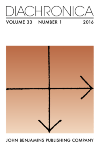
Diachronica
Scope & Guideline
Charting the Course of Linguistic Transformation
Introduction
Aims and Scopes
- Historical Linguistics:
The journal emphasizes the study of language evolution, including sound changes, grammatical shifts, and semantic transformations, showcasing a strong foundation in traditional historical linguistics. - Interdisciplinary Approaches:
'Diachronica' integrates methodologies from various disciplines such as computational linguistics, typology, and sociolinguistics, allowing for innovative perspectives on language change. - Cross-Linguistic Comparisons:
A core focus is on comparative studies across different language families and dialects, providing insights into universal patterns and unique developments in language evolution. - Focus on Understudied Languages:
The journal highlights research on lesser-known languages and dialects, contributing to the documentation and understanding of linguistic diversity and change. - Methodological Innovation:
'Diachronica' encourages the use of cutting-edge techniques, such as Bayesian approaches and computational modeling, to reconstruct linguistic histories and analyze language change.
Trending and Emerging
- Computational and Algorithmic Methods:
There is a significant increase in studies utilizing computational methods and algorithms to analyze historical linguistic data, reflecting a trend towards data-driven research that enhances the understanding of language change. - Language Contact and Hybridization:
Research focusing on the effects of language contact, including borrowing and relexification, is gaining traction, emphasizing the impact of sociolinguistic factors on language evolution. - Diachronic Typology:
Emerging interest in diachronic typological studies, which analyze language change through typological perspectives, is evident, indicating a shift towards understanding the structural implications of language evolution. - Sign Languages and Non-Traditional Linguistic Forms:
The journal has seen a rise in research addressing the historical linguistics of signed languages and other non-traditional forms, expanding the scope of linguistic change beyond spoken language. - Environmental and Sociocultural Influences:
Increasing attention is being paid to the role of environmental and sociocultural factors in shaping linguistic change, reflecting a broader understanding of the contexts in which languages evolve.
Declining or Waning
- Traditional Phonological Studies:
Research that solely concentrates on phonological changes without integrating broader linguistic contexts has become less frequent, indicating a move towards more holistic approaches that consider syntax, semantics, and sociolinguistics. - Prescriptive Grammar Theories:
There is a noticeable decrease in the exploration of prescriptive grammar frameworks, as the journal increasingly favors descriptive and empirical approaches that reflect actual language use over normative rules. - Historical Text Analysis:
While historical texts remain relevant, there is a reduced emphasis on purely textual analysis, with more research focusing on computational tools and methodologies for linguistic reconstruction. - Isolationist Language Studies:
Studies focusing exclusively on individual languages without considering their contact with other languages or dialects are appearing less frequently, suggesting a shift towards understanding languages within their broader sociolinguistic contexts.
Similar Journals
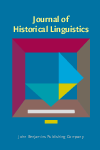
Journal of Historical Linguistics
Illuminating the Journey of Linguistic TransformationJournal of Historical Linguistics, published by JOHN BENJAMINS PUBLISHING CO, is an esteemed peer-reviewed journal that has carved a niche in the intricate field of linguistics and language. With its ISSN 2210-2116 and E-ISSN 2210-2124, the journal has made significant contributions since its inception in 2011, continuing its impactful discourse until 2024. Located in the Netherlands, the journal showcases a commitment to advancing our understanding of language evolution, change, and historical linguistics, providing invaluable insights for researchers, professionals, and students alike. As demonstrated by its commendable rankings—placing it in the Q3 quartile for linguistics and language with a Scopus rank of #275 out of 1088—this journal stands as a critical resource for those invested in the empirical and theoretical aspects of language history. Its accessibility enhances its reach, allowing for a wider distribution of knowledge in this vital scholarly area.
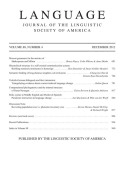
LANGUAGE
Connecting Scholars in the World of LanguageLANGUAGE, published by the Linguistic Society of America, is a premier academic journal dedicated to the rigorous study of linguistic theory and practice. With an ISSN of 0097-8507 and E-ISSN 1535-0665, this esteemed journal has established itself as a leading publication in the field of linguistics since its inception. The journal has consistently maintained a high impact factor, being ranked in the Q1 category in Linguistics and Language for 2023, placing it among the top tier of academic journals. Notably, it also holds impressive Scopus rankings, being positioned at #75 out of 1088 in Arts and Humanities, and #89 out of 1167 in Social Sciences, demonstrating a significant impact and reach in the discipline. While it is not an open-access journal, LANGUAGE provides crucial insights into linguistic research, fostering a vibrant academic community. Spanning years from 1996 to 2024, it continues to be an essential resource for researchers, professionals, and students alike, aiming to advance the understanding of language in its myriad forms and functions.

Journal of Portuguese Linguistics
Connecting Scholars through Portuguese Language InsightsThe Journal of Portuguese Linguistics is an esteemed peer-reviewed academic journal published by UBIQUITY PRESS LTD, dedicated to the exploration of the rich complexities of the Portuguese language and its various linguistic dimensions. With an ISSN of 1645-4537 and an E-ISSN of 2397-5563, this open-access journal has been disseminating valuable research since 2002, ensuring that knowledge is accessible to all scholars, professionals, and students interested in Linguistics. Based in Portugal, it features a distinct focus on the linguistics pertinent to the Portuguese language, facilitating discussions that span theoretical and applied interests. The journal holds a respectable Q3 quartile rank in the field of Linguistics and Language, reflecting its growing significance and contribution to academia, as evidenced by Scopus rankings that place it in the 71st and 68th percentiles in Arts and Humanities as well as Social Sciences. Researchers and practitioners alike will find Journal of Portuguese Linguistics to be an indispensable resource for fostering discourse and innovation in the study of language.
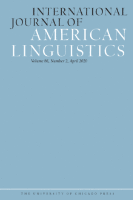
INTERNATIONAL JOURNAL OF AMERICAN LINGUISTICS
Unveiling Insights into American Linguistic Diversity.The INTERNATIONAL JOURNAL OF AMERICAN LINGUISTICS, published by University of Chicago Press, is a revered scholarly publication dedicated to the exploration and advancement of linguistic studies, particularly those related to the American linguistic landscape. With an ISSN of 0020-7071 and an E-ISSN of 1545-7001, this journal serves as a vital platform for researchers, professionals, and students interested in the nuances of language, dialects, and linguistic structures through rigorous academic inquiry. The journal has established a commendable impact, reflected in its ranking within the Q2 category in Linguistics and Language and its placements in the Scopus rankings, thereby positioning itself within the 50th to 53rd percentile of its respective fields. While the journal does not provide Open Access options, it continues to be a cornerstone resource for those seeking to expand their understanding of American linguistics, already converging from 1996 to 2024. Through its continued commitment to excellence, this publication remains essential for those aiming to contribute significantly to the field.

Taiwan Journal of Linguistics
Advancing Linguistic Insights from Taiwan and BeyondTaiwan Journal of Linguistics, published by CRANE PUBL CO, is a prominent Open Access journal dedicated to the field of linguistics since its inception in 2003. With its ISSN 1729-4649 and E-ISSN 1994-2559, this journal serves as a vital platform for the dissemination of significant research and scholarly discussions from Taiwan and beyond. The journal particularly focuses on advancing knowledge in linguistic theory, language acquisition, phonetics, and sociolinguistics, catering to a diverse academic audience including researchers, professionals, and students. Although it currently holds a Q4 ranking in the Linguistics and Language category, the journal's commitment to quality and accessibility positions it as an emerging resource for those engaged in language studies. Currently ranked #584 in Arts and Humanities and #668 in Social Sciences, it provides critical insights and fosters scholarly exchanges that enhance understanding within the field. The journal's open access model ensures the broadest reach for its published articles, facilitating the global sharing of linguistic research. For more information, visit the journal’s website to explore its latest publications and submission guidelines.
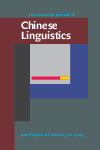
International Journal of Chinese Linguistics
Advancing Knowledge in Chinese Language StudiesInternational Journal of Chinese Linguistics is a distinguished publication that delves into various aspects of linguistic studies pertaining to the Chinese language. Published by John Benjamins Publishing Co, this journal stands out for its commitment to advancing the knowledge and understanding of Chinese linguistics within the global academic community. With an impact factor that places it in the Q2 quartile of linguistics and language, the journal is indexed in prominent databases, achieving ranks of #501 in Arts and Humanities and #580 in Social Sciences. These rankings reflect the journal's dedication to maintaining high scholarly standards and its relevance in both linguistic research and practical applications. While not categorized as Open Access, the journal provides necessary access through institutional subscriptions, thereby ensuring that valuable research reaches a broad audience. Covering a wide range of topics from syntax and phonetics to sociolinguistics and applied linguistics, the International Journal of Chinese Linguistics serves as an essential resource for researchers, professionals, and students seeking to deepen their understanding of the intricate relationship between language and culture in the Chinese context. With converging years from 2019 to 2024, it continues to evolve, reflecting ongoing developments in the field.
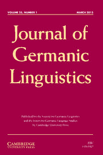
Journal of Germanic Linguistics
Innovating Research in Germanic Language StudiesThe Journal of Germanic Linguistics, published by Cambridge University Press, is a premier academic journal dedicated to advancing scholarship in the field of linguistics with a particular focus on Germanic languages. With an impressive impact factor and a well-established reputation, this journal attracts contributions from leading researchers and professionals who delve into the complexities of language, syntax, semantics, and phonology. The journal holds a prominent position in its category, recognized as Q2 in Linguistics and Language and Q1 in Literature and Literary Theory according to latest rankings. By fostering innovative research, the Journal of Germanic Linguistics plays a crucial role in shaping the discourse around Germanic linguistics, providing an essential platform for both emerging scholars and seasoned academics alike. Although it does not offer Open Access options, it continues to be a vital resource for the global academic community, with a convergence of works published throughout its history from 2001 to 2007 and again from 2009 to 2024, ensuring an enriching repository of research for future generations.

Jezikoslovlje
Championing Scholarly Excellence in LinguisticsJezikoslovlje, published by the Josip Juraj Strossmayer University, Faculty of Philosophy in Croatia, is an essential publication in the field of Linguistics and Language Studies. Launched in 2008 and extending its contributions to the academic community through 2024, this journal addresses a spectrum of linguistic research, facilitating scholarly dialogue around both theoretical and applied aspects of language. With a current Scopus ranking placing it in the 54th percentile in the Arts and Humanities and the 50th percentile in Social Sciences, Jezikoslovlje serves as a vital resource for researchers and students looking to engage with contemporary linguistic issues. Although it operates under a traditional access model, its indexed presence and rigorous peer-review process ensure that published works maintain a high scholarly standard, inviting contributions that advance understanding in this dynamic discipline. The journal's commitment to fostering knowledge in linguistics makes it a significant platform for academics in Croatia and beyond.
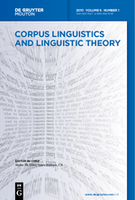
Corpus Linguistics and Linguistic Theory
Pioneering the dialogue between theory and linguistic data.Corpus Linguistics and Linguistic Theory, published by DE GRUYTER MOUTON, is a premier academic journal dedicated to advancing the interdisciplinary field of linguistics through the lens of corpus-based research methodologies. With an ISSN of 1613-7027 and E-ISSN 1613-7035, this journal is a valuable resource for linguists, researchers, and students who aim to investigate language structures, usage, and their theoretical implications. Recognized as a Q1 journal in the realm of Linguistics and Language, it boasts impressive Scopus rankings, positioning it within the top 7% and 8% of its categories in the Arts and Humanities and Social Sciences, respectively. Its relevance is underscored by a commitment to publishing rigorous research from 2005 to 2024, addressing contemporary advancements in linguistic theory fueled by empirical data. While the journal is not open access, it remains an essential platform for disseminating high-quality scholarship that informs both theoretical perspectives and practical applications in linguistics. As such, Corpus Linguistics and Linguistic Theory plays a crucial role in shaping the future of linguistic studies, making it indispensable for anyone engaged in this dynamic field.
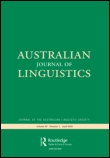
Australian Journal of Linguistics
Shaping the Future of Linguistic InquiryThe Australian Journal of Linguistics, published by Routledge Journals, Taylor & Francis Ltd, stands as a distinguished platform in the field of linguistics, fostering rigorous academic discourse since its inception in 1981. With an ISSN of 0726-8602 and an E-ISSN of 1469-2996, the journal has achieved a notable Q2 ranking in the linguistics and language category for 2023, indicating its quality and relevance within the academic community. With a Scopus ranking of #316 in Arts & Humanities and #373 in Social Sciences, it sits in the 71st and 68th percentiles respectively, underscoring its impact in the fields it encompasses. The journal aims to publish high-quality research articles that contribute to the understanding of linguistic theory, sociolinguistics, and applied linguistics, making it an essential resource for researchers, professionals, and students alike. The journal is based in the United Kingdom, at 2-4 Park Square, Milton Park, Abingdon OX14 4RN, Oxon, England, and actively encourages contributions that can expand the current linguistic discourse, reinforcing its commitment to highlighting diverse perspectives in language research.